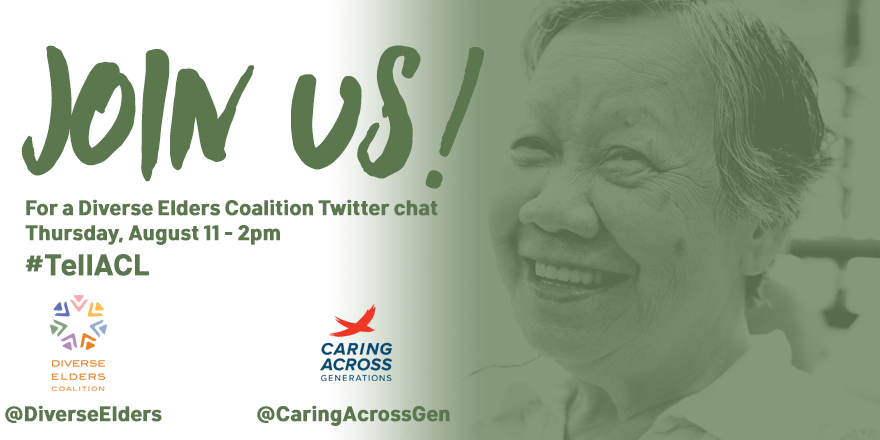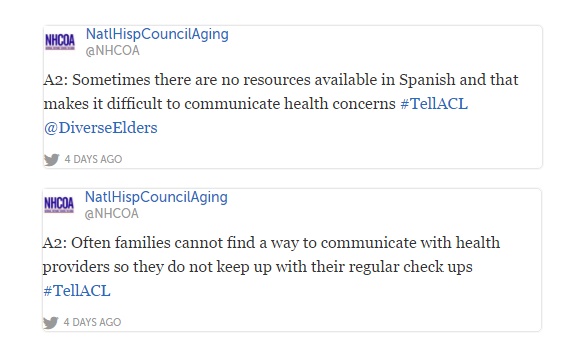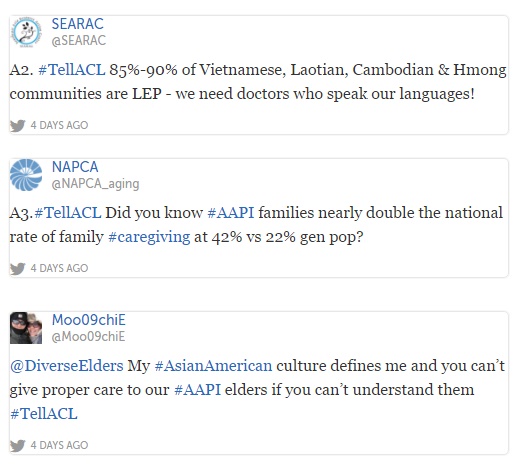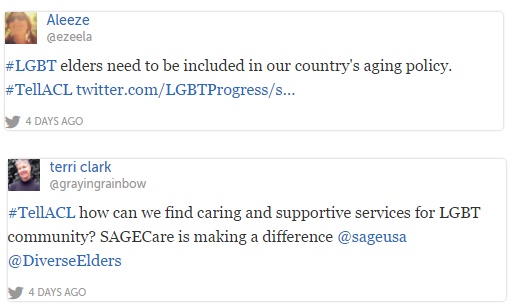Next Monday, August 22nd, is the deadline for submitting your comments to the Administration for Community Living (ACL) about what diverse communities need to age successfully. Our #TellACL campaign has encouraged elders around the country to speak up about what matters to us as we get older.

On Thursday, August 11th, the Diverse Elders Coalition and Caring Across Generations hosted an online day of action around the #TellACL campaign, including a Twitter chat. This chat brought together elders, caregivers, and advocacy organizations from around the country to talk about the needs of American Indian/Alaska Native elders, Asian American/Pacific Islander elders, Black elders, Hispanic elders, and LGBT elders. You can read a Storify of the one-hour chat here: https://storify.com/DiverseElders/diverse-elders-coalition-tellacl-twitter-chat
Some of the most important things we heard during the chat were about the challenges that our communities face as they seek health and aging services. The National Hispanic Council on Aging (NHCOA) reminded us that Spanish-speaking providers and Spanish-language materials are not always available at the doctor’s office, so it can be hard for Hispanic elders and their families to communicate their needs.
Staff members and constituents from the National Asian Pacific Center on Aging (NAPCA) and the Southeast Asia Resource Action Center (SEARAC) reminded us of the necessity of culturally and linguistically competent services for Asian American and Pacific Islander elders. Some Southeast Asian American populations — including Hmong, Laotian, Vietnamese, and Cambodian American communities — are as high as 90% limited-English proficient. And if caregivers and health providers aren’t proficient in AAPI native languages, they won’t be able to provide the best care possible for these elders.
Other participants in the Twitter chat, including staff from SAGE (Services and Advocacy for GLBT elders) affiliates and the National Indian Council on Aging (NICOA), reminded us that aging services and supports must explicitly welcome our diverse communities into their programming. LGBT elders have faced a lifetime of discrimination and are understandably wary and vulnerable. American Indian/Alaska Native elders also have a long history of trauma at the hands of government. Health and social services providers must recognize and be prepared to respond to those very real cultural scars.
Be sure to check out the complete transcript of our #TellACL twitter chat, and add your thoughts to any and all of the comment cards we’re delivering to the Administration for Community Living next week! Your comments will directly impact the way that aging services are delivered in the United States and will improve the lives of diverse elders for years to come.
- Increase language access and data collection for AAPI older adults: NAPCA’s and SEARAC’s Comment Card
- Account for the cultural and linguistic needs of Hispanic older adults: NHCOA’s Comment Card (En Español)
- Ensure that American Indians, Alaska Natives and Native Hawaiians receive fair and equal aging and support services: NICOA’s Comment Card
- Protect LGBT elders from isolation and expressly include them in services for older adults: SAGE’s Comment Card (En Español)
The opinions expressed in this article are those of the author and do not necessarily reflect those of the Diverse Elders Coalition.




